Investing.com’s stocks of the week
by Clement Thibault
Recently, we discussed the immediate and potentially longer term fallout of Brexit for London's financial sector. The financial sector, along with the real estate market and the travel industry, have taken major hits following the UK decision to leave the EU.
EasyJet (LON:EZJ), the low cost airline based in London, lost 33% in the two trading days following the referendum's result. International Consolidated Airlines Group (LON:ICAG), British Airways' parent company, issued a profit warning on Friday. Thomas Cook (LON:TCG), a United Kingdom-based leisure travel company, also lost about 20% in two days of trading. Foxtons Group (OTC:FXTGY), a London-centric real estate agency lost 25% of its value after the vote, when it said [leaving] the EU would depress London property sales for the rest of the year.
Naturally, individual stock losses beget drawdowns on the larger indexes in which they trade, and indeed, over the past few days the world's markets have been shakily contemplating the business consequences of Brexit. The S&P 500—almost at a new all-time high of 2120 points at the beginning of June—now trades in the neighborhood of 2000 points.
But though Brexit losers appear to proliferate, there have also been some early winners. The winners are, not surprisingly, multinationals, consumer staple favorites which are generally considered safe havens during times of economic uncertainty, gold miners (since gold itself is considered perhaps the ultimate safe haven) and companies with little or no exposure to the UK market or to the pound sterling.
Fresnillo (LON:FRES), a holding company that, through its subsidiaries, is involved in mining non-ferrous materials, and Randgold Resources (NASDAQ:GOLD), (LON:RRS), a UK listed mine exploration and development company, are the two biggest gold and silver companies on the London exchange. The rush to gold, of course, is also reflected in the share price of the companies mining it. In the two days following Brexit, Fresnillo climbed more than 19%:
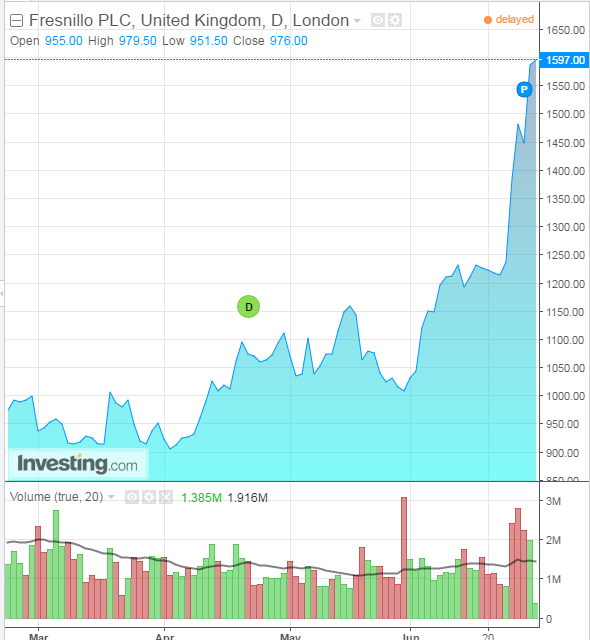
Randgold has gained 24% over the same period:
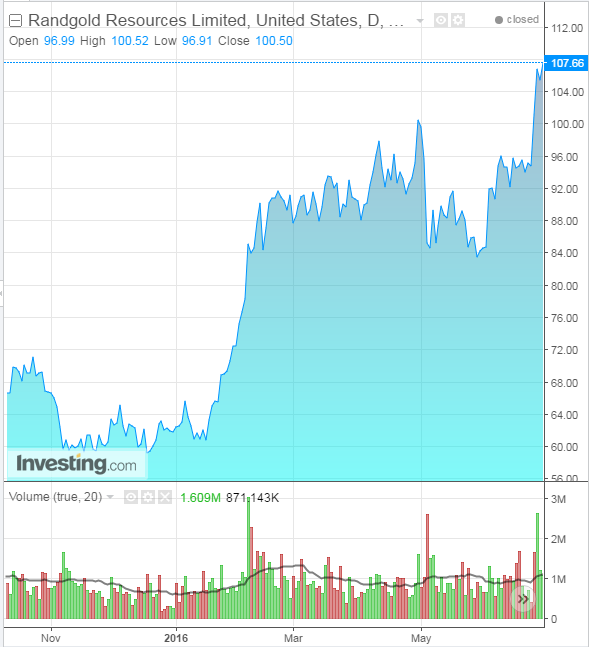
Big Pharma has also been doing well since the British exit. That's a turnaround given the pharmaceutical industry in general had a difficult start to 2016. Pricing controversies and fraudulent reporting cast a shadow over the industry, dragging down even the sector leaders. No longer. British industry giants GlaxoSmithKline PLC (LON:GSK), (NYSE:GSK) and AstraZeneca PLC (LON:AZN), (NYSE:AZN) were considered to be largely unaffected by the consequences of Brexit, as investors flocked to the global companies.
AstraZeneca gained 8% since Brexit, while GlaxoSmithKline gained 5.5%. Considering the British market overall hasn’t reacted well to Brexit—those are handsome three-day returns.
Oil majors, led by BP PLC (LON:BP), (NYSE:BP) and Royal Dutch Shell (LON:RDSa), (NYSE:RDSa) held their own against the turmoil. The effect of Brexit on Brent and Crude oil has caused the commodities to shed a few percent, but they didn’t break the price at which they traded just the week before, which was good news for investors.
Still, although both companies have significant presence in the UK and the EU, neither expects adverse consequences as a result of the vote. In fact, BP has decided its headquarters will remain in London.
Last, though hardly least, non-cyclical consumer large caps have also fared quite well amid the uncertainty. Three of the largest consumer staple stocks appear to have the trust of investors and the capability of weathering the storm. Since Thursday's close, each has performed quite well:
- Unilever (LON:ULVR), (NYSE:UL), a supplier of food, home and personal care products has gained 6.2%.
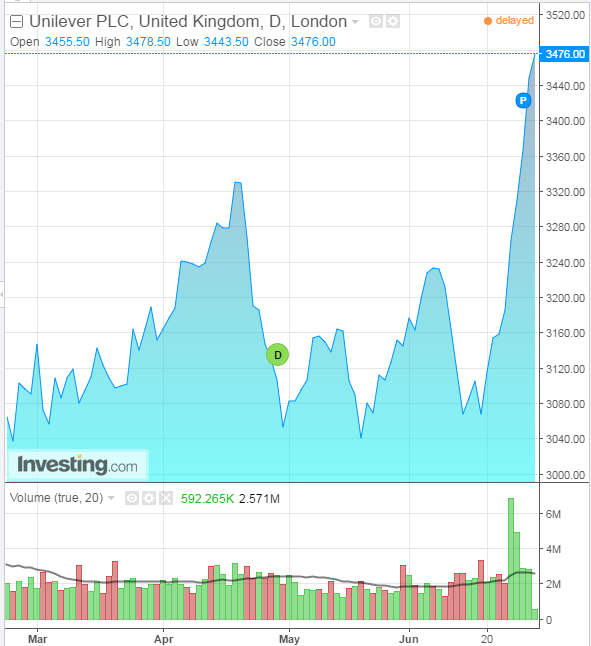
- Diageo (LON:DGE), (NYSE:DEO), a producer of alcoholic beverages has risen 7.2% since the referendum.
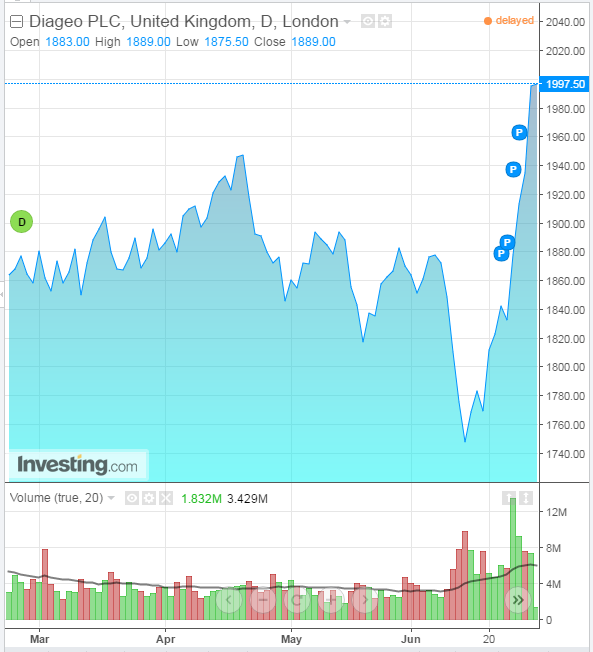
British American Tobacco (LON:BATS), (NYSE:BTI), the cigarette and cigar maker, is up 8%.
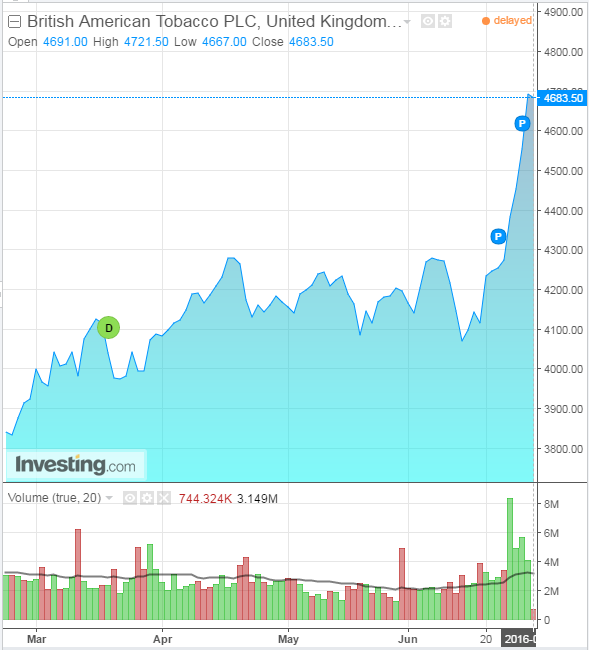
Given the nature of each of these businesses and their diversified geographic exposure, Brexit will likely not have much of a negative effect on their bottom lines.
Conclusion: Our recommendation on diversification among large cap multinationals remains intact. It is worth noting that the FTSE 100 hasn’t been hit as brutally in the short term as many expected. That would appear to be good news for both bullish investors and 'Leave' supporters.
However, the full consequences of the vote will only be known months from now, and only after Britain triggers Article 50, something that reportedly will not take place until after a successor to British Prime Minister David Cameron has been named. Till then, we expect volatility and uncertainty to dominate the markets' mood.
Be wary of small cap and cash-strapped companies. They'll be riskier investments than usual. And always do your due diligence.
